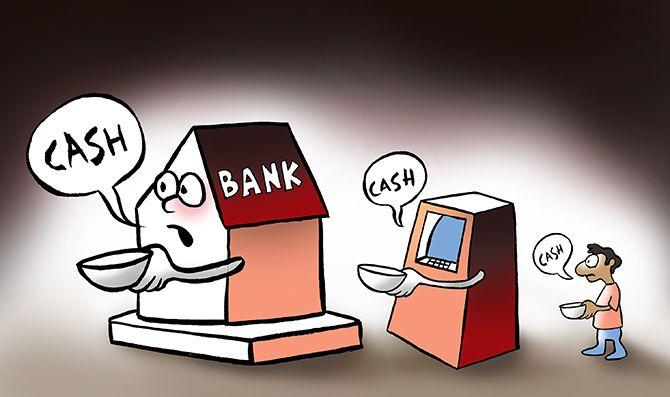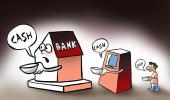'The current crisis is a result of a clash between a coercive attempt by the government to justify demonetisation and rising digital transactions against the market and the economy fighting the unexpected pressure from atop.'

Illustration: Uttam Ghosh/Rediff.com
The cash crunch started in south India and then surfaced in other parts of the country over the last two weeks.
"The government has to substantiate that why if the cash withdrawal this year is actually less than that in the same period last year, did it put the blame on it (unusual spurt in demand)?" Praveen Chakravarty -- a former investment banker and a political economist who heads the Congress' data analytics department -- tells Abhishek Waghmare.
Where exactly is the root of the cash crunch problem?
Before we talk about the root of the problem, let us get to what is more bewildering than the shortage itself.
The RBI in its press release (April 17) said there is sufficient cash in their vaults and currency chests.
At the same time, the finance ministry came up saying that there is an unusual spike in cash demand.
When currency management is under the exclusive purview of the RBI, and there is confusion between the RBI and the government, there is a problem.
To say that we have enough currency, but the problem is in the ATMs or cash movement does not absolve the central bank of its responsibility.
Who do you agree with more -- the government or the central bank?
A recent report by Credit Suisse says that compared to the Rs 450 billion worth of cash demand from April 1 to 13, 2018, which the finance minister mentioned, the demand in two previous years in the same period -- the first 13 days of April -- was about Rs 500 billion.
The government has to substantiate that why if the cash withdrawal this year is actually less than that in the same period last year, did it put the blame on it (unusual spurt in demand)?
Other reasons being discussed are the virtual disappearance of the Rs 2,000 note, elections and the rabi harvest season. What do you think?
With regard to the harvest season and elections, don't they appear in all states and in some states, respectively, every year? Doesn't work.
As for the Rs 2,000 note theory, reports in July 2018 had said that printing had stopped as early as February 2017, more than a year ago.
If that is the case, why did the crunch happen only in April 2018, and not in September 2017 or December 2017? This too does not explain the crisis.
Some are pointing towards the velocity of money, specifically money in the form of the Rs 2,000 note.
Why is the velocity issue new if the printing of the note stopped more than a year ago?
But then, do you think there is enough cash in the economy? Does India need more cash?
The Indian economy needs a certain proportion of currency depending upon the growth in GDP (gross domestic product) for efficient running.
Between 2008-2009 and 2015-2016, the ratio of currency in circulation (CIC) to GDP was between 11.5% and 12%, which reduced to 8.7% immediately after demonetisation.
This CIC/GDP ratio has reached about 10.7% as of now, which directly suggests that we have less than required cash in the economy.
The current crisis is a result of a clash between a coercive attempt by the government to justify demonetisation and rising digital transactions against the market and the economy fighting the unexpected pressure from atop.
Is the reduced printing of currency then the only reason for cash shortage?
Let me give you an analogy. Let us say, I am on a diet, and losing weight, and I do not need more food. So I am losing weight because I have restricted the supply of food.
But one cannot make an argument that because one is losing weight, one doesn't 'need' more food.
Similarly, one cannot put blame on the velocity of money, logistics issues when the currency itself is in less amount than required.
It is the shortage at the very source itself that has caused the velocity to reduce, logistics issues to surface, which are mere symptoms.
The RBI is producing less cash in the first place, that is the cause.
Does the implementation of GST (goods and services tax) have to do with the cash crunch?
Cash was, and is, used by most small businesses who are currently below the threshold of the GST regime.
So, though GST definitely has changed the taxation structure, there is no data or evidence that proves that GST has reduced the need for cash.
It is still way too early to see that sort of change to happen under GST.
Who is responsible for this hardship?
The government has no business in dictating the RBI on currency management which is under exclusive purview of the central bank.
But we know that the rules have changed; none of the old rules hold.
The finance minister gave a statement before the RBI issued a press release, which are in discord, which shows confusion between the two, and the overarching influence of the government.
Do you think people have lost faith in banks and are holding cash at home?
There is no data that substantiates theories such as these.
But the fact remains that India needs more currency in the system, and the RBI is solely responsible for the cash to sustain in the economy.
Whatever garb the government puts on the RBI's failure to do so, be it digitisation or sudden spike in cash demand, none of these is a valid explanation.
I hope it listens to the market.











